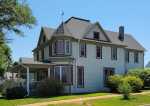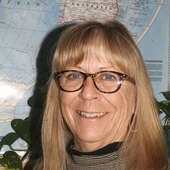- Research tips and McCook Brick Company- solid as a brick (12/16/24)
- Big Give appreciation and some railroad characters (11/15/24)
- George Randel becomes a landowner, gets married, and takes in a Buffalo Bill show (9/20/24)
- The memoirs of George F. Randel, early settler of Red Willow County (9/12/24)
- Vietnam War Memorial honors Nebraskans who served (6/13/24)
- McCook business promotions - just prior to 1893 stock market crash (5/30/24)
- Shall we dance? Meet you at the Gayway (12/8/23)
Dr. Emma Easterday, early McCook doctor
Friday, July 23, 2021

Courtesy photo/Sue Doak
Dr. Emma Easterday came to McCook in 1893 and practiced medicine here until her death, at age 74, in 1937. Her office occupied the first floor of her home at 312 East First Street, now a private residence.
By Linda Buck for Susan Doak
Linda Buck graciously agreed to share this story of McCook’s woman doctor, Emma Easterday. Linda portrayed Dr. Easterday in the 2021 Cemetery Tour and has a special interest in Emma because Linda now owns the (beautifully preserved) home our lady doctor lived in. Here is her story, researched and written by Linda.
Emma Meinhardt Easterday is one of the featured women in the most recent Buffalo Commons cemetery tour. The inscription on her tombstone is stated simply, “wife of Horace”. Emma is an important, yet lesser-known early settler of McCook. Walt Sehnert wrote a few articles on the early doctors of the area, and you can’t talk about the early doctors without a mention of the “…very spunky lady. She quickly proved her medical skills and was accepted by the medical men of the community. In May 1896, Dr. Easterday assisted Dr. Gage in an appendicitis operation.” The Tribune reported, “… it was thought to be the first operation of its kind in this part of Nebraska.”
Born in Germany in 1862, Emma immigrated with her family when she was six. I found an 1873 newspaper notice of a Dr. Fredrick Meinhardt relocating from Oneida, New York to Beatrice, Nebraska. The Beatrice Weekly Express reports, “He is an old practitioner, and will give his whole attention to his profession here.” Later that year, we find where Emma is a star student in primary school. It is likely that Emma assisted her father in his medical practice. Not unlike what we see with immigrants today where children who are quick to learn the language, assist in translation for their parents.
The 1880 census has Emma living in Nemaha, Johnson County, Nebraska with the Martin V. Easterday household. Emma’s occupation is listed as School Teacher. Also in the household is Horace H. Easterday, 21, Farm Laborer. This is surely how the two first meet, yet it is uncertain if romance is sparked at this time. Shortly after this census is taken, Horace is employed by the railroad, settles in McCook and in 1886 files a homestead claim northwest of the town. In 1881, Emma goes to Lincoln to attend the University, then Chicago where, in 1885, she receives her degree from the Hahnemann Medical College. She is one of seventeen women in the graduating class of ninety-seven: one of five with a previous degree. The Chicago Tribune lists the accomplishments and awards, Emma receives books for the “best report of women’s clinic.”
In late 1892 I find the marriage certificate and heartwarming notice in the McCook Tribune, “…on the evening of December 27th, 1892, at seven o’clock, Mr. Horace H. Easterday of our city and Miss Emma T. Meinhardt of Wheaton, Ill., were made husband and wife. The groom, well the Colonel, is the rustling grain dealer of our city and all-around prince of good fellows and his superior sense and good judgement have never been so well displayed as in the step he has taken, and in the selection of so estimable a bride as Miss Meinhardt.”
January 29, 1900, Horace dies of Bright’s disease (kidney disease). Emma takes over the management of the farm and the H.H. Easterday & Co. grain elevators in McCook and Perry. Emma also purchases a home at the corner of Madison and Douglass, does an extensive remodel adding a second story and space for her private medical practice of which she manages until her death in 1937. Emma is active in her church and community, serving on the cemetery and hospital boards, and contributes to the building funds for the Masonic Temple, Keystone Hotel, and other local businesses. She is a featured speaker at the University of Nebraska Alumni Club a few months before her death. From the McCook Republican, “Dr. Easterday in her pleasing, personal way, gave reminiscences of the university as it was over a half a century ago.”
Emma lives modestly and so it is a surprise to the community to learn how much she is worth, approximately $2.1 million in today’s dollar. Emma leaves money to her church, a few close friends, and business associates. She remains close with Horace’s family, leaving money to one of his nieces.
Frank Real, who became a part owner of the grain elevators in 1906 (Real & Easterday), buys out the Easterday shares from her estate.
The farm is gifted to the St. John Commandry to further philanthropic projects in the community including scholarships to graduating high school students. Her scholarship program continues to this day.

